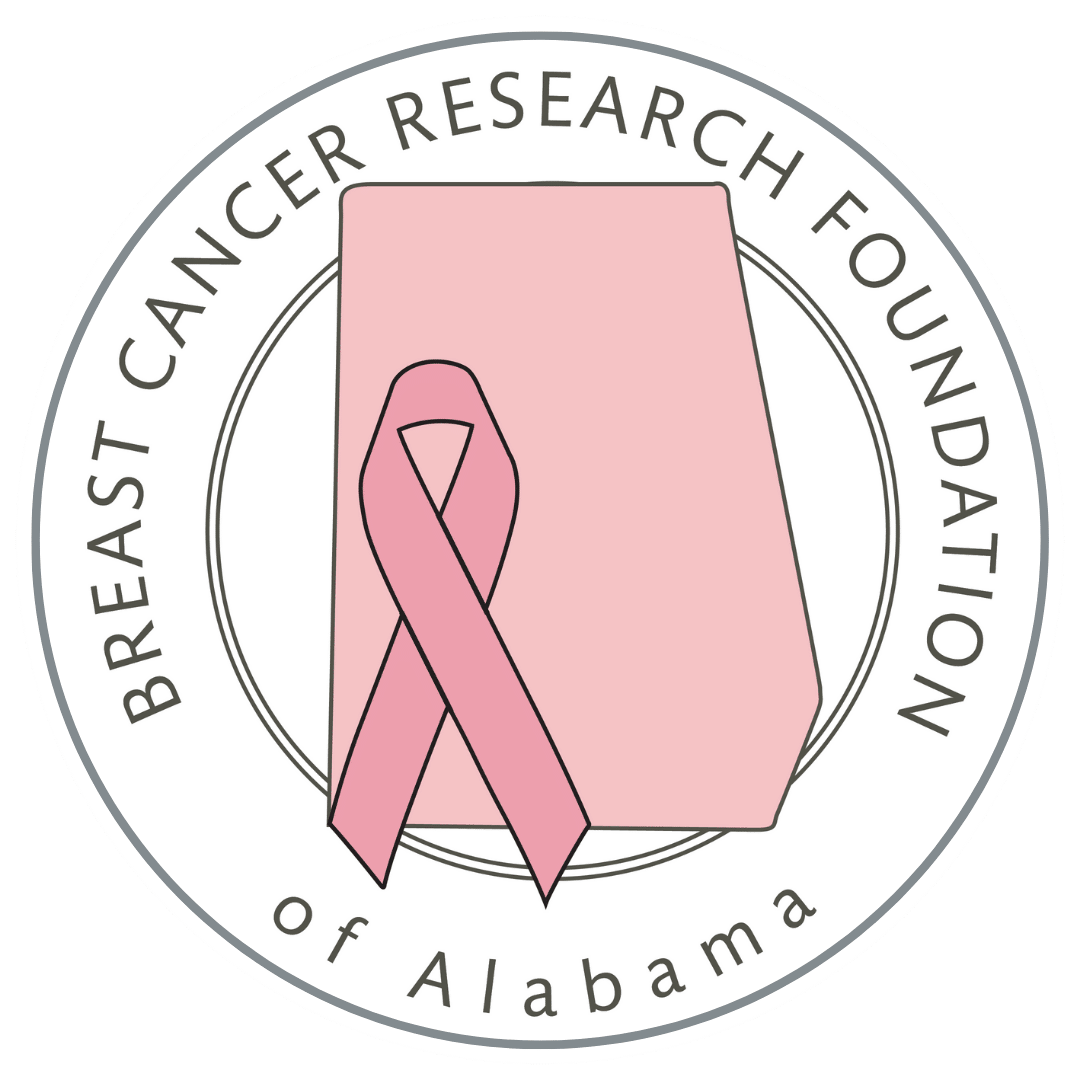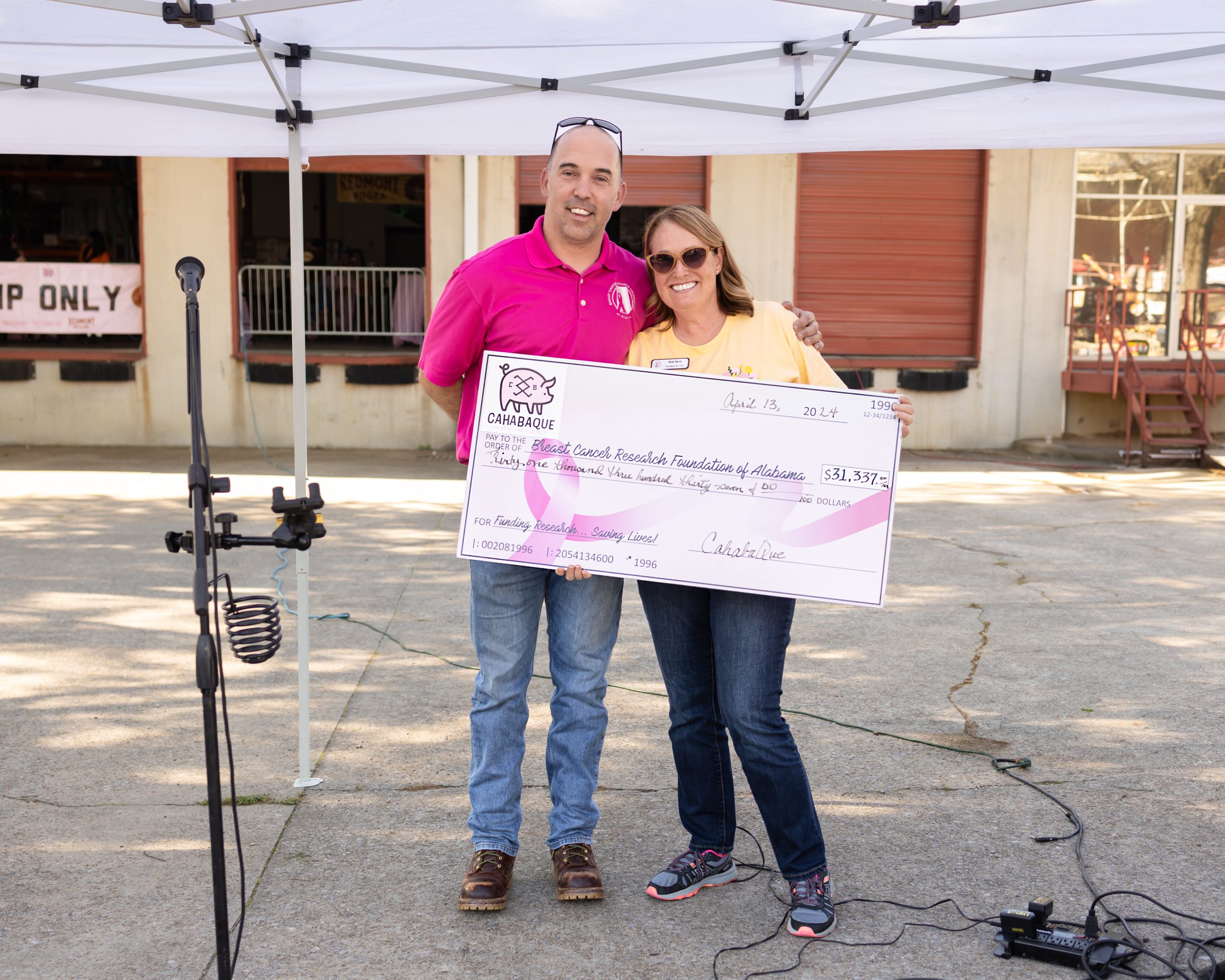NEWSROOM
Our Latest Updates
Bow-Up Against Breast Cancer archery tournament raises over $7,000 for breast cancer research
The Breast Cancer Research Foundation of Alabama (BCRFA) once again…
The Breast Cancer Research Foundation of Alabama added two new researchers to its Medical Advisory Council
The Breast Cancer Research Foundation of Alabama has expanded its…
The 29th annual Drive Out Breast Cancer golf tournament raises $120,000 for local breast cancer research
On May 20, the Breast Cancer Research Foundation of Alabama…
BCRFA Funds O’Neal Cancer Research with Recent Grants
The BCRFA is pleased to announce $210,000 in funding to…
BCRFA Funds UAB Research on Exercise, Gut Microbiome, and Breast Cancer: Increasing Reach to Underserved Populations (EMBRACE)
Dr. Laura Rogers, Professor in the Division of Preventive Medicine, Department…
Flamin’ Hot News: CahabaQue BBQ Cook-Off Raises Over $31,000 for Local Breast Cancer Research
Cahaba Brewing Company and the Breast Cancer Research Foundation of…
RECENTLY FUNDED RESEARCH
Thanks to generous supporters like you, the BCRFA invested $1.25 million in 35 breast cancer research projects at 8 institutes across the state in 2023.
Birmingham


Evaluating associations of rurality and neighborhood disadvantage with racial disparities in breast cancer mortality among women in the state of Alabama
Ritu Aneja, PhD
Read More

Neuropathological effects of chemotherapeutic drugs
Dr. Sofia Beas
Read More

Predicting the Risk of Heart Failure in Breast Cancer Survivors
Smita Bhatia, MD, MPH
Read More

Understanding how multi-level factors influence cancer clinical trial enrollment decisions by patients living in higher disadvantaged areas
Dr. Nicole Caston
Read More

FAM129B/NIBAN2 as a biomarker for therapy with NRF2 inhibitors
Anindya Dutta, MD, PhD
Read More

Targeting CSF1R/PU.1 signaling and PU.1 super-enhancer regulation in tumor progression across breast cancer subtypes
Blake Eason Hildreth, III, DVM, MS, PhD
Read More

Phase II single arm trial of low dose capecitabine in patients with advanced breast cancer
Katia Khoury, MD
Read More

Hijacking axonogenesis to promote breast cancer by a subset of regulatory T cells
Jianmei Leavenworth, MD, PhD
Read More

Nuclear FAK-mediated epigenetic reprogramming of triple negative breast cancer
Dr. Steve Lim
Read More

Research conducted by Breast Surgical Fellow
Dr. Catherine Parker
Read More

Elucidating the effects of hypoxia on ribosome biogenesis in breast cancer
Dr. Amr Rafat
Read More

Unique Arteriolar Niche in Expansion of Breast Cancer Stem Cells for Metastasis
Bin Ren, MD, PhD
Read More

A novel clinically actionable approach to disable resurgence and metastasis of triple-negative breast cancer
Lalita Shevde-Samant, PhD
Read More
Mitochondrial trafficking in triple negative breast cancer
Drs. Keshav Singh and Sejong Bae
Read More

PDL1-targeted theranostic approaches to enhance combination therapy in TNBC
Dr. Anna Sorace
Read More

MammOnc-DB: Development of a comprehensive breast cancer platform for data analysis, integration and visualization
Dr. Sooryanarayana Varambally
Read More

Identifying ideal reimbursement “dose” to reduce clinical trial-related financial toxicity
Dr. Courtney Williams
Read More

Developing novel AKT degrader to selectively inhibit the growth of PI3K/AKT/PTEN pathway mutant breast cancer
Jia Xu, PhD
Read More

Chronic stress-regulated tumor-neuroimmune network in triple-negative breast cancer
Chao Zhang, MD, PhD
Read More


Getting the right treatment to the right patient by matching regimens to patient biopsy before treatment
Karim I. Budhwani, PhD, DLA and Chelsea Crawford, PhD
Read More
Mobile


WNK1, A Novel Regulator of Metastatic Breast Cancer
Dr. Debanjan Chakroborty
Read More

Circulating mitochondrial DNA for the detection of breast cancer progression and recurrence
Dr. Santanu Dasgupta
Read More

Contribution of PERK+ Polyploid Giant Cancer Cells in the Ethnic Disparity of Triple Negative Breast Cancer
Dr. Luis del Pozo-Yauner
Read More

Targeting the nerve-cancer crosstalk to prevent breast cancer metastasis
Dr. Simon Grelet
Read More

Adipocyte and lymphatic endothelial cell crosstalk in breast cancer
Dr. Chandrani Sarkar
Read More

Unfolding a novel mechanism for endocrine resistance in breast cancer
Dr. Ajay Singh
Read More

Influence of stress on immune landscape and spatial heterogeneity of breast cancer
Dr. Seema Singh
Read More
Auburn


Highly Active Liposomal Formulation of Proteasome Inhibitor Carfilzomib for the Treatment of TNBC
Dr. Alexei F. Kisselev
Read More

A novel strategy to prevent the development of drug resistance in breast cancer
Dr. Amit Mitra
Read More

Development of advanced substitute antibody phage probes for screening/detection of breast cancer using sensitive inexpensive blood tests
Dr. Valery Petrenko
Read More
Carrier-free quercetin nanoparticles for overcoming breast cancer drug resistance
Drs. Yuping Bao and Robert Arnold
Read More
Huntsville


Inherited breast cancer risk screening and education – Access Matters
Dr. Sara Cooper
Read More
Tuscaloosa


Engineered environments to probe immune cell-mediated reawakening of dormant breast cancer brain micrometastasis
Dr. Shreyas Rao
Read More
Tuskegee


Cancer genomic study to characterize genetic and epigenetic diversity of immune landscape in triple negative breast cancer in women of African ethnicity
Dr. Deepa Bedi
Read More
BLOG
Read Stories from Real People Impacted by Breast Cancer
“Ask every question” Rebecca Johnson’s determination to beat breast cancer
At the age of 33, Rebecca Johnson was diagnosed with breast cancer. Rebecca shares her story of resilience…
“Trust your intuition”: Lexie Appleby’s strength in facing a breast cancer diagnosis and her resolve to help others conquer their own challenges.
On May 3, 2024, Lexie Appleby celebrated her one-year complete remission. At the age of 28, Lexie was…
‘If you feel something, say something’: Erica Mitchell’s journey of genetic testing
Though not having breast cancer herself, Erica Mitchell comes from a family with a high history of breast…

















